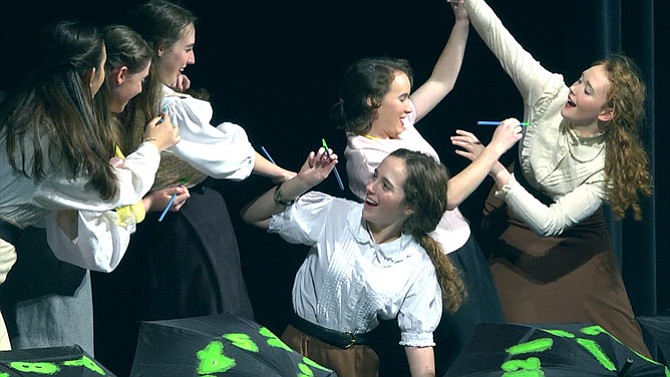Yorktown High School actors will perform “The Girls Who Glow” on Thursday, Feb. 11. Photo Contributed
On Thursday, Feb 11, Ginny Mohler will be back at her old high school in Arlington, where she was a theater student 10 years ago. This time, she’ll be there as a prize-winning filmmaker, watching the Yorktown High School actors perform “The Girls Who Glow,” an adaptation of her screenplay. The one-act drama is a sister project of the feature film “Radium Girls” which Mohler co-wrote and is slated to direct this spring.
After the 7 p.m performance, Mohler will take part in a “talkback” with Carol Cadby, the Yorktown High School theater teacher, and the student actors who make the historical drama come to life. The evening is free and open to the public and co-sponsored by the League of Women Voters-Arlington and American Association of University Women-Arlington, with a social hour and refreshments provided by Yorktown Theatre Arts Parents.
The Radium Girls were teenage factory workers in New Jersey in the 1920s who were slowly poisoned while painting glow-in-the-dark watch dials with radium. Mohler is determined to make their story known, in part because it relates to so many injustices today, she says, citing as one the Samsung factory in South Korea where workers have fallen ill making smartphones and other consumer products. Not only were the Radium Girls deceived about the suspected dangers of radium, they were instructed to lick the tip of the brushes they used to create a fine point for painting the numbers on the watch faces. When the girls began to suffer pain, crumbling bones, loss of teeth and other debilitating effects, their suspicions were dismissed, ignored, and ridiculed.
Mohler discovered their story after she graduated from New York University Tisch Film School in 2011 and was working as a researcher on a documentary about the atomic bomb. In 2013, the screenplay “Radium Girls” by Mohler and co-author Brittany Shaw won the NYU-Alfred P. Sloan $100,000 Feature Film Production Grant. This grant provides the initial funding for the film she is now making with producer Lydia Dean Pilcher, founder of Cine Mosaic, an independent production company. The Yorktown High School production was adapted by Yorktown Advanced Theatre IV students and Cadby, who chairs the Yorktown theater department. She is also the lead theater teacher for Arlington Public Schools and an adjunct acting professor at George Mason University.
Mohler learned that the injustices the Radium Girls faced were daunting — corporate greed and lies, a callous legal system, abusive labor practices that preyed on the vulnerable and disregarded the health and safety of working-class women. That is why telling this story is important to the League of Women Voters and AAUW, which work for women’s rights and human rights. Despite these obstacles and against all odds, six of the Radium Girls sued the U.S. Radium Corporation. After being worn down by endless legal delays, the dying workers received a small settlement, much less than they had asked for.
Even though they didn’t get the compensation they deserved, Mohler credits the Radium Girls with a historic achievement in forcing the radium company to go on the record and expose its deceptions and distorted research at a time when corporations were considered beyond reproach. The girls were not victims, she said. “They found their voice in seeking justice. I want to make sure we honor that.”
Like the Radium Girls who sued, Mohler is dedicated to seeking justice and empowerment through storytelling. The growth and change she has experienced over the four years she has worked on the film parallels in many ways the fictional coming-of-age journey of the feature film’s protagonist, Bessie, who goes from dreamy teenager to radical activist as she loses her sister to radium poisoning.
“It really feels like the story picked me, I didn’t pick this story,” she said. By the end of the film, Bessie has become a very different person, questioning what “the system” does and says. Mohler has also learned to question established historical facts, now knowing that there are alternate historical perspectives, not just the ones enshrined in history books.
“We won’t be able to do anything about injustices until people are aware,” Mohler said. “Being at that first stage of real awareness is frustrating but this is the beginning of that road to change. So I’m grateful I stumbled across this story and that it took hold.”
